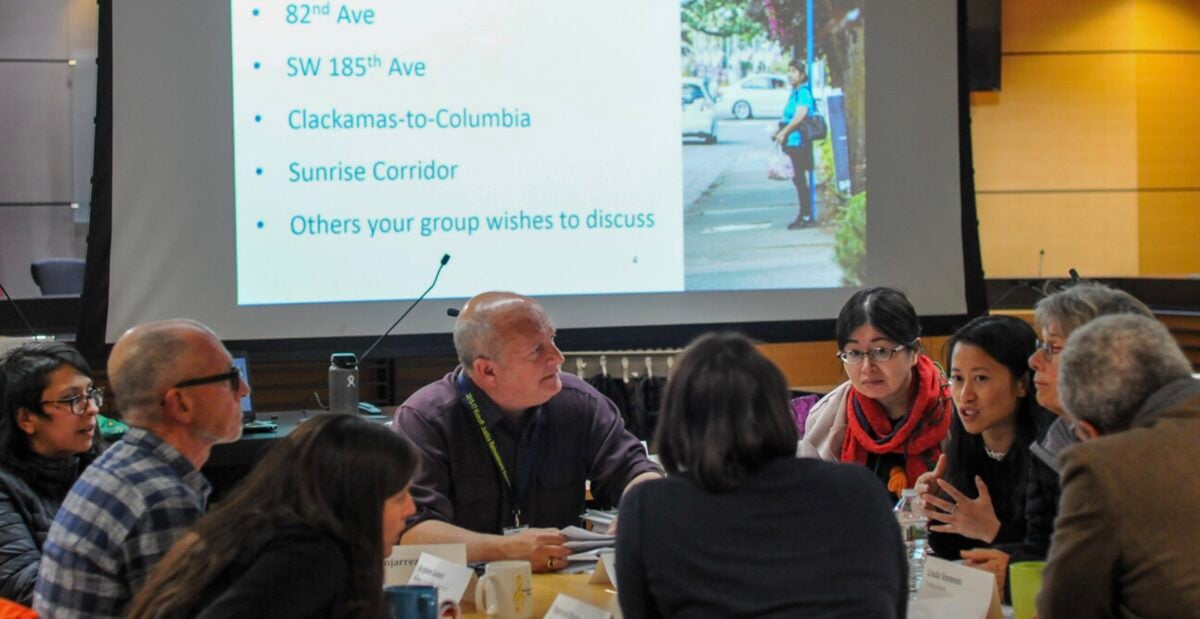
(Photo: Jonathan Maus/BikePortland)
In my memory there has never been a more divisive issue inside Portland transportation reform activist circles than Metro’s transportation investment measure.
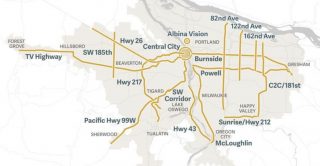
The package of proposed investments has been hailed by some as an exciting opportunity and panned by others as a missed opportunity. 26-218 would raise $5 billion (and leverage a potential $2 billion more in federal funds) for projects and programs with a 0.75% payroll tax (to begin in 2022) on the 9% of businesses in the region with 26 or more employees. And while you might think billions of dollars for transportation would be enough to make skeptics overlook quibbles and get on the bus with a “yes” vote, this measure is under a real threat of failing as loud “nos” are being heard from both usual and unusual voices.
Why people like this measure
26-218 is unprecedented as much for what it is as for how it came together. Not only would it thrust Metro into a much more significant role as a steward of our regional transportation network (combining their already influential role in planning with real pursestrings), the package was put together by a broad coalition of racial, social, and environmental justice organizations.
Many people think this measure is a chance to make good on our promises and pledges to do better around racial justice and equity and to have the usual players step aside and let groups who work with Black, Indigenous and other people of color lead the way to a more fair future. The Getting There Together Coalition fully endorses this measure not just because they believe it helps their communities, but because they were at the table when it was created.
26-218 would invest hundreds of millions into deadly arterials like Tualatin Valley Highway and 82nd Avenue that plague neighborhoods where our region’s low-income and communities of color live and work. Speaking of work, supporters of the measure say the 150 projects will create over 37,000 good-paying jobs. It would also provide full funding for the City of Portland to create a network of protected bike lanes downtown. Beyond infrastructure, the measure would pump $1 billion into vital programs including free TriMet youth pass for all students in the region.
Advertisement
With major funding that will improve bicycling, walking and transit, it’s not hard get excited about the potential. We desperately need more investment in transportation and historically marginalized groups need to be the ones telling us where and how to do it. This measure does both those things.
But some folks see a devil in the details.
Why people don’t like this measure
Of course there is a huge pushback from a big business and anti-tax group because this is a new tax and they don’t trust Metro’s intentions. I won’t address concerns of those groups here.

What’s more revealing is how 26-218 is opposed by media (it’s the only local measure the Willamette Week urges a “no” vote on) and some people in the progressive flank of the transportation reform ecosystem.
The most notable opposition is from economist and City Observatory Publisher Joe Cortright. Cortright has earned respect in many local transportation circles for his dedicated opposition to freeway mega-projects like the Columbia River Crossing and the I-5 Rose Quarter project. He’s an ardent critic of the Oregon Department of Transportation and an advocate for cities where it’s easy to bike walk and take transit.
That’s why many eyebrows were raised when Cortright published a scathing takedown of 26-218 back in August. His nine bullet points allege (among other things) that the measure will “do nothing” to lower greenhouse gas emissions, has a clumsy revenue source that subsidizes drivers, doesn’t take Covid-19 realities into account, and is “founded on a highway-oriented concept of corridors, rather than a more sensible approach emphasizing walkable centers and main streets.”
And then there’s the SW Corridor light rail project — the biggest-ticket item in the entire package at nearly $1 billion. TriMet’s new MAX line has lots of detractors who feel the design is way too car-centric, won’t move the needle for climate change or transit ridership, and that bus rapid transit would be a better investment. One trusted source told me they believe the entire measure was crafted solely to ensure SW Corridor funding.
These are all serious critiques. But you know that saying about perfect being the enemy of the good?
Perfection and the public good
Few people know more about Metro and transportation than Chris Smith. A trusted activist currently in a tight race for a seat on Metro Council, Smith supports the measure while acknowledging its shortcomings. Smith’s detailed statement says 26-218 “fails” to reduce greenhouse gas emissions and that targeting business payroll is “not an ideal tax”. Even so, “It’s a useful and probably politically necessary first step,” Smith wrote.
Advertisement
During a City Club debate on Tuesday, Smith re-iterated his support saying, “We have finally reached a broad consensus on the project list, and I think it’s time to move forward.”
Milwaukie Mayor Mark Gamba has pinned his political hopes (including a recent run for Congress) on his fight against climate change. Given that Metro’s own modeling shows 26-218 might not result in greenhouse gas emissions reductions, I was curious about his stance. “I support it,” Gamba shared via email this week. “It’s far from perfect, but it moves the next light rail line forward, it tests some concepts for improving bus service, and it pretty dramatically increases safety for walking and biking on all of the corridors which are some of the worst in the region. I think it could have done a lot more to improve bus service, it could have fixed some big gaps in bike infrastructure. But it is a start.”
At a time when centrism is a political liability and the extremes hold so much sway, a moderate measure like 26-218 faces a serious challenge at the ballot box.
How will you vote? Help others decide by sharing your opinion in the comments.
— Jonathan Maus: (503) 706-8804, @jonathan_maus on Twitter and jonathan@bikeportland.org
— Get our headlines delivered to your inbox.
— Support this independent community media outlet with a one-time contribution or monthly subscription.



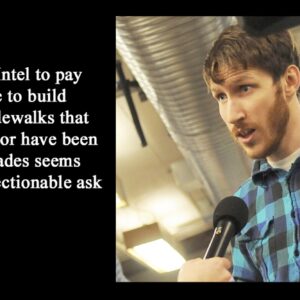
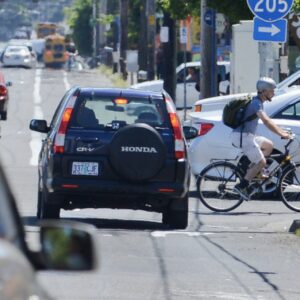
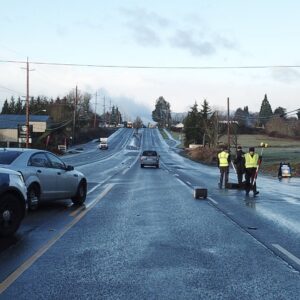
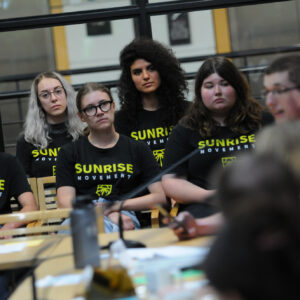
Thanks for reading.
BikePortland has served this community with independent community journalism since 2005. We rely on subscriptions from readers like you to survive. Your financial support is vital in keeping this valuable resource alive and well.
Please subscribe today to strengthen and expand our work.
I’m voting for it.
I reached out to Senator Mark Hass to figure out why he’s the poster child against the measure in these negative YouTube ads I’ve been seeing but he hasn’t replied yet.
As a newcomer to Portland, I will be voting “yes” on this measure. I think the most salient argument is the one you make regarding perfect being the enemy of the good, Jonathan. Progressives must seize the moment, obtain the funding and continue to push for evermore progressive measures and infrastructure to implement in the near future. I hope the measure passes and a new chapter will begin to be written in the name of equity and climate responsibility.
My main issue with the measure is that fate has ruined the timing of the measure. We are at a time when congestion is at the lowest point in 15 years ( at least temporarily) and many people are working from home and have spent very little time on the road the last 6 months so traffic has moved to the bottom of their list of concerns. On top of that many people are feeling much poorer, and even though the tax may not effect many of them, it changes the mental calculus. Also the pandemic has knocked the wind out of transit ridership ( also temporarily) and many non-transit folks are seeing empty trains and buses and though it has logical operation reasons it again changes the mental calculus. I understand the reasons to strike while the Iron is hot, jobs are needed and funds are available but this is striking me as one of histories errors of bad timing.
We agree! 2-3 years ago would have been a much better time for this proposal.
“…jobs are needed…” is a laser pointer at the rot in this proposal. The 37,000 jobs figure is the sizzle that I think is turning some people’s heads. It’s not 37,000 carpenters and steelworkers going to work tomorrow at union scale wages. It’s a number of construction jobs, for a year or a season or the length of a contract, supplemented by a larger number of collateral service industry jobs for lesser pay. Jobs, yes, but the number touted is misleading.
It seems rather unfair that the tax does not include local and state government employers (like Metro itself) and only hits private employers. I guess if I was Metro I would exempt myself but it seems like eventually if you make it more and more expensive for private employers to employ local workers the employers are going to hire fewer people or move.
Oregon has one of the lowest corporate taxes in the nation. Where are these private employers going to move?
you don’t have to work about the employers. it’s the employees. We’re going to work from home outside of Multnomah County.
If the payroll tax was really not a big deal then why exempt yourself and the rest of the government agencies in the area? Don’t the employees of those organizations use transit? It feels a lot like someone saying that they have a great idea that will help everyone but they would rather you pay for it without their help. What happened to everyone pitching in? Is Metro saying that it would be difficult for them to pay the payroll tax?
It’s funny that most of the discussion is about the $1B for SW light rail, which is only 20% of the funding in the measure. Most of this money is going to improving streets like 82nd, Burnside, Powell, 122nd, and 162 in East Portland: adding sidewalks, bike lanes, bus lanes, and buying Trimet new buses.
Even the Willamette Weekly shows that the project list is good:
“Metro has attempted to prioritize transportation spending in underserved areas, such as 82nd Avenue in Portland, Tualatin Valley Highway in Washington County, and along McLoughlin Boulevard in Clackamas County. Projects in those areas would serve more people of color and low-income Oregonians who have historically not benefited from transportation improvements. The measure would also pay to convert a large portion of TriMet’s fleet to electric buses and enhance bus service in major corridors—as well as build 45 miles of new sidewalks, install 140 miles of bike lanes, and give transit passes to all high school students in the Metro region. Those would all be significant improvements.”
But WW decided to oppose the measure because they don’t like payroll taxes and are annoyed that Metro chose not to tax local government workers. This is rather silly reasoning: there is no realistic alternative for funding which would be better. Most other cities fund transportation with sales taxes, which is not an option here, and property taxes are limited as well. I would like a higher gas tax and a carbon tax, but that should be done at the State and Federal level. A payroll tax is a reasonable option.
They also complain that “This tax never ends, even after all the projects on Metro’s list are finished. It’s a vote for whatever Metro wants to build next, forever.” This is a BS anti-tax argument. A stable funding source for transportation is good, because it means that Trimet will have stable long-term funding: it’s not much good to build new trains and buses if we don’t have funds to run them. We elect the Metro board, and we will get to decide how to spend this tax, and voters can also chose to end it in the future.
I absolutely won’t trust an Oregonian endorsement, and I have to take WWeekly endorsement with a HUGE grain of salt. What does the Mercury say? https://www.portlandmercury.com/election-2020/2020/10/15/29535217/mercury-2020-endorsements-mayor-and-portland-city-council
https://www.portlandmercury.com/election-2020/2020/10/15/29540543/mercury-2020-endorsements-local-ballot-measures
It looks like the Mercury likes it. I was leaning against after reading Joe Cortright’s write up on BikePortland, but now I’ll have to rethink.
I was just reading the Mercury’s endorsement pages and was on that article. I’ve been leaning against it, especially with Joe against it. And I really like Chris and he’s begrudgingly against it. Then I got a bunch of angry “informational” flyers against it solely because of the tax, and that made me think that it might be a good thing.
So the information scale is tipping towards a YES vote.
My only hope is that in the future we’ll be able to reclaim all the new space we create for cars and move it over to active transportation in the future.
There will be some future reclaiming to do no doubt. In the present, infrastructure designed and built for active transportation is way cheaper per mile and more of the money goes to workers as opposed to materials. An ‘iridium’ bike and ped facility stomps a lot less green space than a car freeway.
Imagine the I-5 median between here and Eugene. What a bikeway you could put there if it weren’t trapped in a raceway and flushed with internal combustion exhaust. Building roads for cars now costs more than money.
I use endorsements as a crutch when I don’t care enough about something to learn or think about it. If I can’t decide on an issue I consult the Oregonian and do the other thing.
To flip your point, why wouldn’t we be discussing $1 billion in wasted dollars. We are talking about an entire 20% of a massive measure going to a project that wont ever meet ridership estimates and provides a low-value, expensive connection to a small suburban town.
Totally agree. We pay taxes to help improve our quality of life. I actually prefer this to gas taxes because then we remain reliant on the automobile to fund active transit projects. Of course, I think gasoline should be much more expensive than it is in this country, but our city/county governments should not have to rely on this source to help build bus/bike/ped infrastructure.
Respectfully, one of the issues is that Metro is not a transportation agency. Metro is responsible for land use planning and it runs the zoo, convention center and recycling programs. Cities, counties, and the state own and maintain and plan their own roads. TriMet runs and plans trains and buses. When theres a pothole or broken traffic light people don’t call Metro, they call their city or county. Giving a permanent transportation tax to Metro really hamstrings local governments resources to determine and pay for their priorities. A significant, one-time regional investment is fine but it should have an end date. Not an open checkbook like this one. All the other tax measures on the ballot have end dates.
Metro is this region’s Metropolitan Planning Organization, or MPO. Look that one up and you’ll see that Metro is in fact a transportation agency. And transportation planning makes a lot more sense when done at a regional level rather than a more local level.
If we put a lot of money, real estate*, concrete, steel, available energy/CO2, human time, and political capital into something at this point in history it should -infallibly- reduce climate change in the fastest way possible. We’ve thrown enough balls out of bounds already. Sorry, football metaphor in a bike blog.
I love trains. Energy efficient, low labor operating cost, potentially really fast and reliable. But, a train in the wrong place is an expensive albatross, stuck in the landscape for fifty or a hundred years. The Metro measure is a huge amount of money wrapped around a project I’m not happy about. I’ve marked my ballot “NO” on this one.
*real estate as in, people’s houses or businesses, but also real estate as in, a continuous line of right-of-way that will not be available for some other project that would serve us better.
I think most pro-transit folks have a similar assessment on the merits of the projects proposed in this measure. Nobody thinks it is perfect, but the projects will do some good.
The point of disagreement is that the anti-measure folks say the payroll tax hike in this measure probably forecloses a lot of needed subsidies for operations in the future, while the pro-measure folks consistently imply there will be appetite for further taxes to subsidize operations.
Additionally, the pro-measure side says this is the best measure available , and we should pass it now to avoid several years of delay in getting these needed projects going. The folks who oppose the measure say that passing this measure would significantly constrain our options for the next 20 years since it would be hard to get people to pay for further operating subsidies or infrastructure improvements (already the TriMet tax is .7%, this measure proposes a further .7%, and operating the additional corridors for new ridership + possible current financial trouble will require significantly higher subsidies, so possibly a further .7%). 2.1% payroll tax is a hefty chunk for regional transit.
I see merit to both sides but ultimately I’m opposed because I don’t like the idea of making this big of a commitment without a commitment to operational funding to back it up.
you can even see that in Chris Smith’s defense that we will need to improve bus frequency AFTER we pass this to meet any of our transit mode share goals… https://chrisformetro.com/campaign-updates/lets-get-moving
Not to keep responding to myself, but my big concern is that if you need to use carrots + sticks to reduce carbon (carrots = infrastructure, sticks = gas tax, congestion pricing, parking limitations)… there is a problem with this package in that it is basically all the carrots. Meanwhile, all the advocates are saying there will be a package of “sticks” to come later and actually bring down carbon emissions. Of course you can see the obvious political problem with putting a bunch of unpopular “sticks” on the ballot!
Moderate is right. Where’s our ST3? How come Seattle can pass a $50 billion plan, and we go all circular firing squad over a $7 billion plan?
That’s not to say it doesn’t have its problems. Metro wasn’t very transparent, and the payroll tax might not be the best funding mechanism. I’m frustrated with the process. Still, I hope it passes. I fear that if it doesn’t pass, the takeaway will be that it was too transit focused, and it will be harder to get bus and rail projects off the ground in the future.
Seattle also has the presence of mind to use security guards to prevent people from urinating on their light rail and trashing it like TriMet.
I already voted “yes” on it. I was back and forth on this measure over the past few weeks, but ultimately decided to not let the perfect be the enemy of the good — and I used that exact phrase when explaining my decision to a friend the other day.
Just wanted to say thanks for the coverage of this issue, and the quality of comments! Will have to consider further.
I am a little puzzled by the claim that “the measure does nothing to reduce greenhouse gases” because, “The measure would also pay to convert a large portion of TriMet’s fleet to electric buses and enhance bus service in major corridors—as well as build 45 miles of new sidewalks, install 140 miles of bike lanes, and give transit passes to all high school students in the Metro region.”
Getting students on public transportation doesn’t reduce greenhouse gases? Teaching kids about public transportation and making this something of a consideration into adulthood doesn’t reduce greenhouse gases?
Installing 140 miles of bike lanes doesn’t reduce greenhouse gases?
Electrifying a large portion of TriMet’s bus fleet doesn’t reduce greenhouse gases?
That last point is especially puzzling given that we live in a region where electricity has such a small carbon cost.
It reduces Portland’s transportation greenhouse gas emission by 0.05% according to Metro’s own documents supporting the measure. Metro has stated that transportation accounts for 40% of all greenhouse gas emission in Portland. So this measure will reduce the total greenhouse gas emission by 0.02%.
https://cityobservatory.org/climate-fail-metros-2020-transportation-package-2/
Well, I’m not happy about paying tax dollars to invest in ODOT corridors. Why should metro tax payers pay to fix up highways? Oregon taxes should be used for that. The fact that ODOT doesn’t want to fix up these corridors shouldn’t be ignored, but throwing city money at it is foolish. It only demonstrates that ODOT can keep on as usual and we’ll clean up after them.
I’ll be supporting this, only because Barbur is dangerous. The improvements are very badly needed. I feel a deep seated animosity toward ODOT. They are not the department of transportation, they are department of cars.
ODOT has and always will be one of the ways that wealthier metro areas funnel money to the poorer rural parts of the state. It costs a lot to maintain the highways in Oregon, and the east and south doesn’t have the population density to support it alone.
I begrudgingly accept it because I like recreating in those places. A lot of these natural areas would be inaccessible or difficult to access without state-funded roads.
I would be fine with that, If Department of Cars didn’t have such open disdain for bicycles. Look at the intersection of Powell and 26th. ODOT dug in their heels until PBOT agreed to remove bike lanes. Only then would the intersection be improved.
Mr. GB Arrington published a thoughtful commentary on why he is opposing this measure. Mr. Arrington is considered by many in the planning world as one of the godfathers of the Portland light rail and transit system and he is a founder of the Railvolution conference.
https://cityobservatory.org/why-this-portland-transit-veteran-is-voting-no-on-metros-bond/
Thoughtful commentary? I thought it was a damning critique. People should read it and trust this expert.
The intro to the discussion is missing some information.
Yes, only 9% of businesses (and non-profits) will have to pay…but they employ 70% of people in the region.
Metro also exempted local and state governments (11% of regional employment) including…Metro…with a last minute amendment that no one got to review ahead of time. Now OHSU (17,000 employees) wants out too.
The hullabaloo around how the measure came together is no different than other things – it’s the same set of special interests that are pulling the strings but this time tried a new tactic and used BIPOC and climate justice groups for cover…the measure won’t improve climate change (by Metro’s own data) and won’t improve safety (because it doesn’t change vehicle miles traveled) and it won’t improve housing (because it makes it easier to live further out and subsidizes suburbs and exurbs and the developers and real estate interests that own land on the region’s edges). However, it’s going to make a LOT of white construction contractors much, much richer and it’s going to further solidify the status quo. Talk about socializing the costs and privatizing the benefits!
As far as the anti-tax angle: giving any government agency a blank check with an unclear understanding of what will be taxed (wages, health care, retirement benefits?) and for how long (no sunset clause) is the definition of bad policy and bad governance. As far as big businesses opposing it, well – take a look at some of the largest donors that gave to the “yes” campaign money:
Name-Amount-Who
Stacy and Witbeck, Inc.-$160000-Light rail contractor
Local 48 Electricians PAC (4572)-$100000-Building trades union
WSP-$50000-Engineering company
Pacific Northwest Regional Council of Carpenters-$50000-Building trades union
David Evans & Associates, Inc.-$40000-Engineering company
American Council of Engineering Companies of Oregon-$26000-Engineering company lobbying organization
UFCW Local 555-$20000-Building trades union
HDR-$15000-Engineering company
AECOM Technology Group-$15000-Engineering company
HNTB Corporation-$10000-Engineering company
Raimore Construction-$10000-Construction company
Parametrix-$10000-Engineering company
Friends of Bob Stacey (13836)-$9500-Metro Councilor!
OTAK, Inc-$9000-Engineering company
DOWL LLC-$5000-Engineering company
Casso Consulting-$5000-Engineering company
CDM-Smith-$5000-Engineering company
RS&H-$5000-Engineering company
LTK-$5000-Engineering company
DKS Associates-$2500-Engineering company
However, no judgement: this is politics – you put your best $$$ forward (on both sides)
As far as the SW Corridor light rail project – Metro’s documentation shows that it doesn’t have any effect on climate change and a very negligible effect on transit ridership (certainly not the effect one would expect by spending $3 billion)
Good getting in the way of perfect? Hardly. How about “wasteful & ineffective” masquerading at progressive?
Chris Smith has been right on some things and wrong on others. He is wrong on this measure. But he can’t get elected if he speaks to the facts of this poorly designed and funded measure and stating that he opposes it. Got it.
I like Mark Gamba. But find me a local politician that opposes having more tax money?
There are many who are conflicted on this measure – their hearts say yes but their brains say no. They desperately want something to be done (we all do) but they know that this isn’t the way to do it.
Also, who will get the plethora of jobs? Out of state construct firms?
While I have my quibbles with the SW MAX and PDX projects, I’m happy to vote YES on this measure in support of the overall improvements we will see to the transit, bike and pedestrian network. It’s rare that we have an opportunity to go big on funding for bus lanes and bikeways, I’m looking forward to voting yes!
As a SW resident I was heavily biased to like the SW Corridor project. The project wasn’t picked earlier because of the relatively low densities and poor ped/bike infrastructure. However,I felt that if it included meaningful active transportation improvements to link MAX with the destinations the line misses (OHSU, Hillsdale, Multnomah Village, and PCC), it could be a success. Unfortunately, the project has been more concerned about retaining auto throughput and park & ride. Other than the proposed ped/bike improvements on Barbur, the most of the active transportation improvement ideas are nothing more than eyewash and wishful thinking. It won’t result in meaningful active transportation benefit, will have limited community-building influence (e.g., West Portland Town Center), and due to low ridership it will join WES and Orange line as a drain on TriMet’s operating budget. Assuming the other corridors in the Metro measure will be “improved” in a similar manner, it will be very expensive and sadly ineffective.
I’m personally disappointed to be voting “no,”
It’s not just economist Joe Cortright who opposes Measure 26-218, so do veteran transit activist GB Arrington and former Metro President David Bragdon. Arrington, who was once TriMet’s Director of Strategic and Long Range Planning, had this to say:
And David Bragdon (who is currently director of a NYC transit think tank) told Willamette Week last March
The SW Corridor Light Rail seeks significant federal money to complete its funding. Arrington–who helped write the federal rules to evaluate which projects will be funded–doesn’t seem to think that SW Corridor is competitive.
On a more personal level, my neighborhood is a couple of blocks from the downtown Portland terminus of SW Corridor. Here’s the thing, we can’t get to it because we don’t have the sidewalks or bike facilities to safely reach it. it’s obvious to me that the SW Corridor Light Rail will do nothing for my neighborhood, nor for many of the other neighborhoods in the southwest. What it will do is suck the air out of future funding for the transportation improvements that we do badly need: more bus service and more sidewalks.
I would vote for a measure that does the following:
1. Light rail on Powell, connecting the Orange and Green lines. Relieves pressure on the Steel Bridge. Green line routes into downtown via Powell, and a new line operates between Clackamas and Gateway.
2. Infill sidewalk and bike lane projects.
3. Light rail on outer Division, allowing for a line from downtown down Powell and Division. New line between downtown and Gresham via Powell/Division
4. SW Corridor done correctly: tunnel immediately south of downtown with subway stops at OHSU, Hillsdale, and Multnomah Village. Line continues as planned to Bridgeport.
5. Electrification of bus fleet with additional “Rose Lane” type projects all over Metro.
But many voters would not pass this. They have to add in the freeway spending to try and satisfy everyone.
That sounds lovely, but I bet it’s $12-15 billion.
I just spent a few hours researching this measure and watching the hour long debate over at wweek.com (worth watching). I was really on the fence about this one, but now I’m a Yes vote. I am attracted to the facts about this measure and am turned off by the main no arguments that sound like the same tired arguments about anything big (great idea but now is not the right time for investment, the details are not perfect so try again some other time, it will cost too much for too little, it will turn away businesses, we don’t know what the future holds, etc.) If you do some over-simplified math, for a $50K employee, the cost is $375 a year.
“the package was put together by a broad coalition of racial, social, and environmental justice organizations.” This is a point I’ve yet to see anyone honor in their comments. I’ve been involved in planning work, it’s a lot of work and if, if, these folks who formed the coalition to create the measure’s details approve of the measure then I’m for it.
After reading a lot about it, reviewing all the comments here, and watching WWeek’s video, I am voting Yes. I have a lot of respect for Joe Cortright and I think he is right about a lot of the points he makes, but I agree with this blog that we can’t let perfect be the enemy of the good. Metro is in a tough place – the lack of investment from state and federal governments are forcing the hand of the local governments to figure out transportation funding on their own. I am grateful that Metro is taking the initiative to
try to figure it out for our region.
Ideally we would have a sales tax or congestion tax, but those types of taxes/fees are extremely difficult to do in Oregon. I trust that Metro has vetted all the various types of taxes and fees and landed on the best option they have.
The SW Corridor project has its flaws, but this funding will provide the last mile connections to hopefully increase use of the new max line along with existing lines.
My hope is that the Biden administration will inject a huge amount of federal dollars through Build Back Better, which will pay for a lot of the projects listed here sooner, freeing up Metro and all the folks who put together the project list to think bigger:
1) Tunnel for max under Willamette River
2) Bus rapid transit on the corridors on this list (99E, 82nd, etc)
3) Water taxi system!!!
So is the CRC coming back to life?